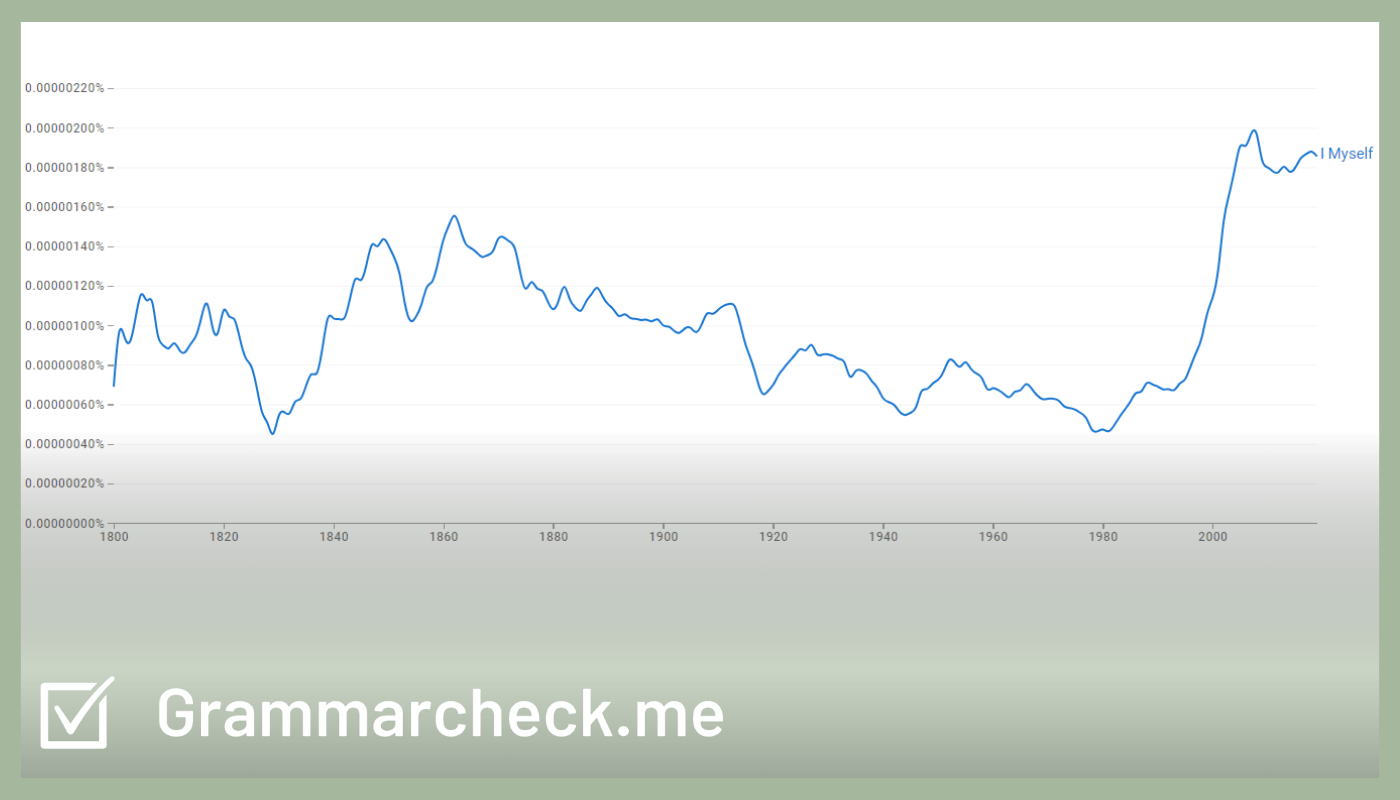The expression “I myself” is grammatically correct. This saying combines the subject pronoun “I” with the reflexive pronoun “myself”. However, in this instance “myself” is used as an intensive pronoun to add emphasis to the subject.
Typically there are no necessary punctuation marks needed when using the phrase “I myself”. But in some instances a comma can be placed before the “I” when this phrase is used in the middle of a sentence.
In this article, we’ll further explore the meaning of the expression “I myself”. We’ll also discuss punctuation, sentence examples, and common synonyms.

Can You Say “I Myself”?
Yes, it is grammatically correct to say “I myself” in the English language. The phrase “I myself” is used to add emphasis to the subject of the sentence.
In this expression, “myself” serves as an intensive pronoun, not to be confused with a reflexive pronoun.
Example Sentence: “I myself will handle the situation.”
In this example, “myself” emphasizes that it is “I” will take care of the situation. You should also understand that it might be overkill to use this phrase in very casual contexts.
What Are The Punctuation Rules For The Phrase “I Myself”?
There is no required punctuation in order to use the phrase “I myself”. In fact, adding commas around “myself” is considered overkill and unnecessary. It disrupts the natural flow of the sentence and makes it more difficult to read.
Placing a comma before the subject pronoun “I” is commonly used when using the phrase “I myself” in the middle of a sentence. It is important to have a firm understanding of major 8 comma rules to punctuation this expression correctly.
Sentence Examples Using “I Myself”
Below are 6 sentence examples that use the phrase “I myself” correctly.
- When it comes to fixing the car, I myself am the one with the most experience.
- In this endeavor, I myself will lead the team to ensure its success.
- Despite the challenging circumstances, I myself remain optimistic about the outcome.
- I myself have been to that museum several times, and I highly recommend it.
- As the author of the book, I myself was surprised by the overwhelming positive response from readers.
- While others may disagree, I myself believe that taking breaks during work can boost productivity.
Just like we saw in our analysis of the “If wishes were fishes saying“, writers need to play close attention to their punctuation.
What Are Synonyms For The Saying “I Myself”?
Synonyms are a great way to add variety your writing and avoid appearing relative to the reader. Here are 8 synonyms you can use in place of the expression “I myself”.
- Personally
- Personally speaking
- On a personal note
- From my perspective
- For my part
- As for me
- In my own view
- Speaking for myself
Just like we saw in our post about the phrase we were, synonyms are a great way for writers to add variety their work!
Popularity Analysis

Is There A Difference Between I vs Myself?
Yes, there is a difference between the words “I” and “myself”. Although they are similar, “I” is a pronoun that is used as the subject of a sentence. “Myself” is an intensive pronoun or reflexive pronoun that is used to add emphasis to the subject or to refer back to the subject within the same sentence.
- “I am going to the store.”
- “I did it myself.”
Frequently Asked Questions
Yes, “I myself” can be used in formal written communication when you want to add emphasis to a statement or clarify your personal involvement in an action.
Reflexive pronouns are pronouns that refer back to the subject of a sentence and indicate that the subject is performing an action on itself. Examples in English include “myself,” “yourself,” “himself,” “herself,” “itself,” “ourselves,” “yourselves,” and “themselves.”
The Bottom Line
By now you should be an expert on the phrase “I myself”. This expression is commonly used as a way to add emphasis to the subject pronoun “I”. Writers should not over punctuate this saying by adding a comma before or after “myself”. This is unnecessary and breaks up the flow of the sentence. There are also many synonyms that you can use in less formal or less important contexts. If you need more help with grammar & punctuation rules like this, consider using our grammar review checker to make things easy!
